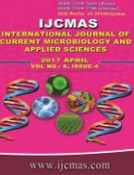


 National Academy of Agricultural Sciences (NAAS)
National Academy of Agricultural Sciences (NAAS)

|
PRINT ISSN : 2319-7692
Online ISSN : 2319-7706 Issues : 12 per year Publisher : Excellent Publishers Email : editorijcmas@gmail.com / submit@ijcmas.com Editor-in-chief: Dr.M.Prakash Index Copernicus ICV 2018: 95.39 NAAS RATING 2020: 5.38 |
Biochar is a carbon rich charcoal-like substance created by thermal decomposition biomass (organic matter) in low oxygen conditions at relatively low temperatures (<700°C), a process known as pyrolysis. Biochar is essentially fine-grained charcoal made up of stable organic material and applied to soils in order to achieve net carbon sequestration, which is being promoted primarily for counterbalancing the impact of climate change and for sustaining soil fertility status. Currently, there is a clear cut evidence of large imbalance between carbon emission to the atmosphere and carbon uptake by the plants for the process of photosynthesis which leads to a continued increase in atmospheric CO2 over long run. Formation of biochar formed though pyrolysis of plant biomass and its application to the in order to achieve higher storage of carbon in soils has been suggested as a means to counterbalance the effect of climate change by sequestering carbon. The principal mechanisms operating in soils through which biochar entering the soil is stabilized and significantly increase its life cycle in soil are its particulate nature, recalcitrance, mean residence time and interaction with mineral surfaces. To derive the maximum possible benefit of carbon sequestration through application of biochar, both yield and stability of the biochar are two important factors and should be optimized. The benefits of carbon sequestration through biochar are more visible in soils lower in carbon than soils relatively higher in carbon. Research evidence suggests that adoption of biochar technology in proper way can address the emerging challenges of agricultural sector and conserve/improve the quality of environment. In this review we evaluate the potential of biochar to reimbursement the current issues related to carbon sequestration.
 |
 |
 |
 |
 |